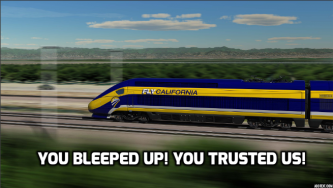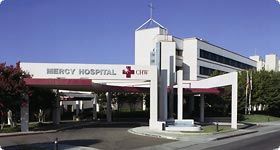Feds abdicate on own rules for CA bullet train $
by Chris Reed | August 14, 2014 8:00 am
 The Obama administration has given the state $3.5 billion in funds for its bullet train project. But the 2009 stimulus funds that were the source of most of the federal bequest came with lots of strings attached, as is common with federal grants.
The Obama administration has given the state $3.5 billion in funds for its bullet train project. But the 2009 stimulus funds that were the source of most of the federal bequest came with lots of strings attached, as is common with federal grants.
Those rules were formally published in the Federal Register on June 23, 2009. As I wrote in 2012[1], the regulations …
… require that applications for stimulus funds to build high-speed rail projects would be approved only after “rigorous analysis,” factoring in a careful examination of the proposed project’s “financial plan (capital and operating),” “reasonableness of financial estimates,” and “quality of planning process.” Grant recipients would make regular progress reports, corroborated by Federal Railroad Administration audits. Even the most cursory analysis shows that the California bullet train falls far short of compliance with the rules.
Nothing has changed since then, but the Federal Railroad Administration continues to depict the project as meeting all rules — even though the rail authority’s “financial plan” amounts to praying for vast new congressional funding and for vast new private investment, which will never be forthcoming without revenue guarantees, which are illegal under state law.
Now the Sac Bee reports[2] another federal agency is abdicating on its responsibilities.
The federal Surface Transportation Board signed off construction of a 114-mile link for the state bullet train over the dissent of a board member who said “the majority’s primary focus seems to have been getting out of the Authority’s way.”
Board encourages disruptions it’s supposed to minimize
I read the entire ruling[3]. In her dissent, member Ann D. Begeman — an Obama appointee — documents how federal regulators are rushing through the state’s requests for exemptions despite the sort of serious complaints that normally lead to further reviews and evidence-gathering.
The Surface Transportation Board is supposed to use its powers to minimize disruptions to existing transportation operations. As Begeman notes, the board’s actions make disruptions much more likely. Granting the exemption just …
… six weeks after the FRA issued its Record of Decision, could have very serious consequences and needlessly impose service disruptions on a key segment of our nation’s freight rail network and its shippers.
Significant portions of the freight rail network have been enduring service challenges since last winter. Addressing existing service problems, and preventing the occurrence of additional operational disruptions, should be foremost on the Board’s agenda. Instead, the majority largely ignores the concerns raised by the BNSF Railway Company, which operates a partially double-tracked freight rail line between Fresno and Bakersfield used by more than 40 trains per day. According to BNSF, “[t]he implications of locating the CHSRA line close to BNSF’s line are considerable and take a variety of forms, including impacts to BNSF’s ability to maintain and use all of its current right-of-way to support freight rail service; its ability to construct spurs to serve current and new industries; electromagnetic interference risks with signals and Positive Train Control Systems (PTC); and height clearance issues[.]”
The Authority and the carrier must reach an agreement to ensure freight service is not jeopardized as a result of this project. Yet, despite discussions between the parties since 2009, “BNSF’s questions have not been answered, leaving many uncertainties about construction and operational impacts of the proposed high speed line to BNSF and its customers.” The Board should have required the Authority to resolve its issues with BNSF before granting its approval. ….
Hospital: Promises made by rail authority not kept
 Begeman also brings up the complaints from a well-known Bakersfield hospital:
Begeman also brings up the complaints from a well-known Bakersfield hospital:
Among the many other important matters raised by interested parties, the concerns expressed on behalf of Mercy Hospital, which remain largely unaddressed here, warrant attention. The proposed high-speed rail line would be located only 191 feet from the hospital … .
Mercy Hospital representatives argue that “[t]rains moving past the hospital at over 100 miles per hour will create noise, vibrations and disruptions to surgical procedures,” but “[t]he Rail Authority has not conducted the noise and vibration studies they promised to do, nor have they developed any mitigation plans for the impact of the trains on the hospital.” According to Dignity Health, which owns and operates Mercy Hospital, “[i]t appears obvious that the Authority believes it does not need to honor its promises to its stakeholders.”
Join the club, Mercy Hospital of Bakersfield. The California High-Speed Rail Authority doesn’t believe it needs to honor any of its promises to anyone.
- wrote in 2012: http://www.city-journal.org/2012/cjc0321cr.html
- Sac Bee reports: http://www.sacbee.com/2014/08/12/6622704/federal-board-approves-144-mile.html
- entire ruling: http://www.stb.dot.gov/decisions/readingroom.nsf/fc695db5bc7ebe2c852572b80040c45f/b6bf84983414d9dc85257d32004f0846?OpenDocument
Source URL: https://calwatchdog.com/2014/08/14/feds-abdicate-on-own-rules-for-ca-bullet-train/